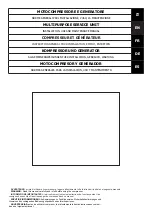
BASIC SETUP & APPLICATIONS
18
If you consider the sound of a snare drum, you will notice the sound has a beginning
loud sound (
transient
) followed by a sound of decreasing intensity (
decay
). Patch a
channel of your ACP-88 for compressing the snare drum as described above and we
can explore some dramatic changes that compression can have on the snare drum's
sound.
For a simple setup, make sure that:
Soft
button is
out
;
Auto
button is out;
Ratio
is set to
4:1
on the legend;
Attack
is
fully counterclockwise
;
Release
is straight up at the
12:00
o'clock position;
Gate Threshold
is
fully counter-clockwise
;
Link
button is
out
and the
Bypass
button is
out
. Adjust the
Threshold
until you see about
-lldB
on the
gain
reduction meters
. At this point, the snare's volume is simply
lowered
by
lldB
. Now slowly
raise
the
Attack
time by turning the
Attack
knob
clockwise
. You should notice that the beginning '
transient
' of your snare
sound is starting to jump out of the speakers and slap you in the face. This becomes
even more noticeable when using digital reverberation on the snare.
Now you can adjust the
Gate
on the snare to stop those other drums from 'bleeding'
through the snare mic: Begin by adjusting the
Attack
time of the
Gate
to
.01
(10
microseconds) by turning the
Gate Attack
control knob
fully counter-clockwise
. Turn the
Gate Release
knob to about the middle position, set the
Gate Range
to
60dB
(
Range
Button pushed-in
), adjust the
Gate Threshold
slowly
clockwise
until you begin to hear
those other drums disappearing.
Too high
of a
Threshold
setting might disrupt the snare
drum's natural sound, a
Threshold
setting that is
too low
will let the sound of the other
drums
open
the
Gate
. You need to adjust the
Gate Threshold
and
Release
to suit your
drumming taste.
This simple application applies to any percussive instrument, of course. Experiment.
•
Limiting
.
Limiting
is defined as compressing with a
Ratio
of infinity to one. This setting acts like
an imaginary ceiling for the level of a signal. On your ACP-88,
Limiting
occurs when the
Ratio
knob is
fully clockwise
. At this point, the
Threshold
knob essentially becomes the
'ceiling' knob for the channel. You will most likely want a virtually instantaneous
Attack
time while
Limiting
. To achieve this: Make sure the
Auto
button is out, Turn the
compressors
Attack
time knob
fully counterclockwise
and set the compressor's
Release
time for the most natural sounding decay for whatever input signal you are using.
(
Warning:
Improper settings of the
Release
time have been known to cause pumping,
breathing and coughing in limiters. Consult your ears when fine tuning.)
Compressing bass guitar.
Very similar to compressing vocals, the bass guitar is almost always compressed or
limited during recording. Start with the setting described above for vocals. Vary the
Compression
Ratio
,
Attack
and
Release
to suite your taste.





































